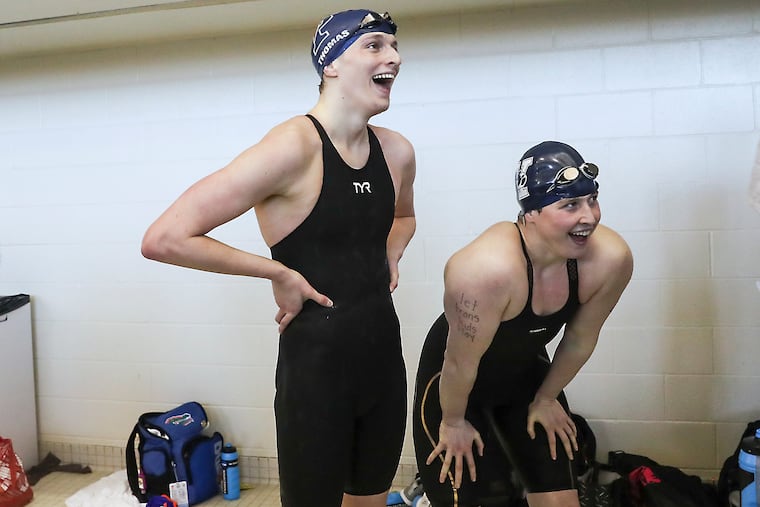Lia Thomas speaks on podcast about trans issues and her experience at Penn
Thomas spoke candidly to a fellow trans athlete about her experience swimming for Penn in the 2022 NCAA championships.

Former Penn swimmer Lia Thomas spoke about her experience as a lightning rod in the topic of trans athletes on a podcast hosted by another trans athlete, Schuyler Bailar, a former swimmer at Harvard.
Regarding when 16 Penn teammates sent a letter to the school written by Nancy Hogshead-Makar that opposed her participation in championship meets, a former Olympian now campaigning for legislation to limit trans athletes, Thomas said it was hard to feel opposition coming from some teammates who she thought had her back. She pointed out the contradiction in the support they were expressing. “They’re like, ‘Oh, we respect Lia as a woman, as a trans woman, or whatever, we respect her identity; we just don’t think it’s fair.’ I think you can’t really have that sort of half support,” Thomas said on the Dear Schuyler podcast released Monday.
Thomas said that if she were being supported as a trans woman, then her right to compete in sport would count as much as those of any woman athlete. “You can’t sort of break me down as a person into little pieces and you’re like, ‘OK, this is OK, this is OK, that’s not.’ It’s pretending to be supportive on some level but in reality it just sort of falls flat.”
Thomas also expressed concern over a trend of legislation around controlling bodily autonomy.
“[There are] broader systems of trying to control people and control people’s bodies and exclude anybody who doesn’t fit a certain mold,” Thomas said. “A true feminist is everybody trying to come together to sort of break down these patriarchal ideals of what a woman is and who can be a woman.”
» READ MORE: Lia Thomas addresses the Biden administration’s proposed Title IX rule change on trans athlete bans
At a certain point in the discourse, it weighed on Thomas that she had become a flashpoint in the debate.
“I definitely struggled with at first, sort of like a year ago following the season, following NCAAs, of feeling almost a responsibility or maybe even a blame for some of the new rulings or rules or legislation,” Thomas said. She realized, however, “It wasn’t me personally that sparked it; it was just [trans-exclusionists] were waiting for a trans woman to be successful to go on a whole tirade against trans people and pass all sorts of legislation. So that’s helped me move past that a little bit.”
Still, she found the legislation discouraging, mostly to a younger generation who might be inspired by her example, but now find themselves with more hurdles to follow any athletic dream. “I want to pass that on to other trans kids and show that you can be authentic to who you are and do the sport or the things you love,” Thomas said. “It’s really hard to see at times that that dream and that goal I’ve tried to strive for is no longer possible in many places.”
Before Thomas ever had any concept of her gender identity, the sport of swimming was a part of her life.
“I have almost no memories of a time before I was a swimmer. It’s something that’s been a huge part of my life since I was young and has been hugely impactful and influential in shaping me as a person and helping me grow and helping me overcome obstacles.” Thomas said. “The joy of being active, of being able to move my body and move through the water and being able to do it with my friends and peers has been an incredible experience and has helped me so much as a person. It’s so sad to see trans kids deprived of that opportunity to learn and grow and develop as a person and play and be active with their friends.”
In the NCAA championship races, Thomas’ most cherished memory was being able to share one particular race with a fellow trans athlete, Iszac Henig, who raced this season for the men’s team at Yale.
“Iszac was a dear friend and getting to race another trans person who is supportive — it was a really incredible experience,” Thomas said.
In that vein, Thomas also wanted to highlight that she did receive a lot of support from fellow athletes, at Penn and other universities, at the competition. Many of them sought her out to express it at the NCAA championships, even as protesters shouted from the stands.
“I never went up into the stands. I’m absolutely sure there were people on the [swimmers’] deck who were not happy that I was there, or who didn’t support me, but nobody like came up to me and was openly antagonistic. There was actually kind of the opposite where the people who did come up to me, who did have something they wanted to say to me were very positive and very supportive — people who were saying that they were proud of me,” Thomas said.
Ultimately, Thomas expressed an optimistic message to young trans athletes.
“It can feel really tough and really lonely and isolating at times but I think it’s important to remember that you’re not alone,” Thomas said. “There’s a huge community of even just trans people who are all here to support you and support each other and there’s a bigger community of cis people who are very supportive.”
» READ MORE: She almost quit swimming. Now, Penn’s Anna Kalandadze is breaking records and aiming for a national title.